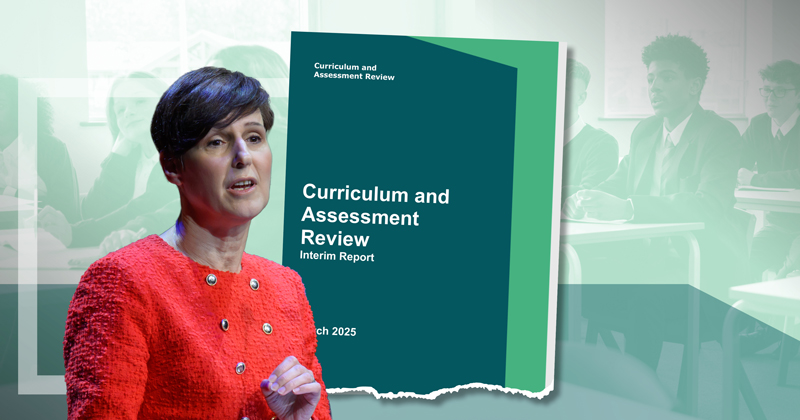As Nelson and Colne College Group unveils a new identity, its leader Lisa O’Loughlin reflects on tackling illness, steering a landmark curriculum review, and why she believes FE can’t lose its heart
Lisa O’Loughlin and the college group she leads have both undergone a transformation.
Her organisation is changing its name from Nelson and Colne College Group to East Lancashire Learning Group to better suit its wide remit.
Meanwhile, O’Loughlin herself has contended with challenges that have altered both her appearance and her mindset. She has, for the last 12 months, faced the pressure of helping decide how to overhaul our national curriculum and assessment system as one of 12 members of the government-appointed curriculum and assessment review (CAR) panel.
And a year earlier, shortly after moving to East Lancashire from her previous role as principal of The Manchester College and deputy CEO at LTE Group, she was diagnosed with grade three breast cancer.
Successive rounds of chemotherapy meant her “very blonde, quite fine and very curly long hair” grew back much darker and thicker, which was “bizarre”, O’Loughlin says.
Now clear of the disease, she jokes she went into chemo with hair like her former-seamstress mum, and came out with her dad’s (a former joiner).
But her new appearance aptly reflects her new “more mindful” approach to how she sees the world and her role in it. She adds: “You think about what’s happening today, rather than constantly thinking about the future.”

Intense times
O’Loughlin’s present is still firmly focused on the CAR panel, as it prepares to present its final report to the government. The review is the most comprehensive attempt since the national curriculumwas introduced in 1988 toconsider curriculum content and assessment methodsacross all phases up to age 19.
O’Loughlin is one of only two panel members who represent FE and has “absolutely” felt a “big burden of expectation” because “these decisions – shaping the national curriculum and pathways post 16 – are so incredibly important”.
It has been a “very intense time” of roundtables, evidence sessions and online webinars. Over 7,000 responses were received to the panel’s call for evidence, which was itself over 100 pages long.
Some have expressed scepticism over the panel’s ability to properly analyse all those lengthy responses in detail.
O’Loughlin admits AI was used to help the panel’s support team analyse responses, but “we also had access to all the specific documents, so panel members were absolutely going into their areas of specialism and reviewing the detailed submissions”.

Finding consensus
The responses demonstrated to O’Loughlin how she had underestimated the “overwhelming” extent to which young people wanted a stake in changing the curriculum. There were “lots and lots of calls” from them for more diversity, which were generally “thought through, considered provocations”.
She was also surprised at the scale of their demands for more education in financial and media literacy, which was highlighted in the review’s interim report.
The panel’s 12 members hailed from all corners of the education sector, from a SEND consultant (Gary Aubin) to Ofqual’s chief regulator, Sir Ian Baukham. “Ultimately”, a consensus was reached on “all” their recommendations, albeit with “a lot of debate”.
The work was a “significant time commitment”. But the fact many meetings were held online enabled O’Loughlin to continue with her day job.
Though the work was “very much evidence-led”, “you always bring the flavour of who you are to it”, O’Loughlin says, adding that she brought her strong passion for curriculum reform as a means of overcoming social disadvantage.

Curriculum passion
That passion pours out of O’Loughlin as she talks about her own college group, which holds an enviable position in the sector.
As well as being the only college in England to have been rated ‘outstanding’ by Ofsted for two decades, it is the top-performing provider of adult education in England by achievement rate and second nationally for overall achievement across all ages and levels.
Its recent pass rate for level 3 technical courses was 98 per cent and 100 per cent for T Levels, which is particularly impressive given its learners hail from relatively deprived communities.
Some of its neighbours have not attained such glory; nearby Furness College is set to merge with Blackpool and The Fylde College (B&FC) after being branded ‘inadequate’ by Ofsted last year, while Burnley College was downgraded to ‘requires improvement’ after being caught inflating achievement rates.
So what is the secret of the East Lancashire Learning Group’s success?
Its “strategic curriculum intent”, says O’Loughlin, is “always high-quality and focused on destinations beyond qualifications, with a real focus on the right programme for every learner”.
Similar buzzwords proliferate throughout the sector. But O’Loughlin claims their culture really is special; her colleagues “live and breathe” the ‘right programme, right learner’ approach “as vocabulary”.
“We provide a forensic approach to personalisation of learning programmes here,” she says.
As an example, she explains how level one and two foundation programmes “very carefully carve out different pathways” for learners, some of which lead to academic progression while others are occupational. All are “very carefully designed to lead to those destinations, with the pedagogies that underpin them”.
O’Loughlin followed a similar ethos at The Manchester College, which won the Queen’s Anniversary Prize in 2021 for its ‘careers not courses’ curriculum strategy.

Striking a balance
Every college leader must decide where to strike the balance between academic and business leadership, and for O’Loughlin, it is very much tipped towards being “led by the academic”, as “that’s where the magic lies”.
“Of course, no chief exec will take their eye off the finances,” she adds, “but there’s a culture where we expect teachers to understand pedagogy and have an academic curiosity for the pedagogies that have impact.”
The college group conducts extensive pedagogical research with the Department for Education, and has just become a post-16 research partner for the Education Endowment Foundation.
There is a “very strong expectation” that lecturers will “very much invest in researching [teaching and learning] and implement what they learn”.
To give them the time for that they have slightly fewer contractual teaching hours than they might at other colleges; 810 hours a year, with community teachers teaching around 100 hours less in recognition of the travel they undertake.
Holidays are also generous at 43 days a year, plus eight bank holidays and five closure/efficiency days.

Capacity constraints
But on the business side of the leadership coin there are capacity and funding challenges that O’Loughlin has to contend with.
The group’s 4 per cent EBITA position in 2024-25 was regarded by its corporation board last year as being “below the level preferred”, with “the ambition for capital investment and reinvestment usually requiring a 6-8 per cent EBITDA”.
Each arm of the group has different needs; the Accrington campus faces more of a “purpose challenge”, with a “very clear focus on re-establishing high-quality technical education” there.
The Nelson campus is currently “experiencing capacity challenges”, with capital investment being its biggest issue. However, ELLG has now been announced as a formal partner in the newly launched North West Construction Technical Education College (CTEC). In collaboration with lead partner Wigan and Leigh College and Blackpool and the Fylde College, ELLG has been entrusted with leading on teaching excellence and technical pedagogy.
To boost capacity, the college will “tend not to overload class teacher ratios, because we are very, very focused on personalised learning programmes”.

But O’Loughlin is also determined the college will not become more selective about who gets a place on its courses.
“What’s often misunderstood about us, because we are incredibly high performing, is that people sometimes assume we’re selective and we’re not at all,” she says. “That [is shown] in our progress scores.
“Apart from any fitness-to-study issues, we accept students whatever their starting points. At the moment, we haven’t had to be more selective. We’ve managed to find innovative ways.”
O’Loughlin says her deputy principal of finance and resources, David Rothwell, who leads her estate strategy, is a “magician” because he “makes things work for us, without compromising the teaching and learning”.
But with population growth expected to continue, she fears a “tipping point” will arrive in the next two years.
The task of keeping the “investment in your colleagues and in your estate in balance” has “obviously been made much harder” by reclassification. The group would “definitely” have otherwise pursued commercial borrowing to repurpose its Accrington campus, but now “the pace is not as fast” for them to access funding.
Meanwhile, O’Loughlin believes young people “really felt” the impact of Covid, which played out in a lack of engagement and a “significant increase” in anxiety and mental health-related issues. But she also believes the “tide is turning”. Attendance rates across her college group in 2024-25 were “much improved”, with a “real strong upturn” in engagement.
“I’m hopeful that we’re over the hump of that, particularly in my college,” she says.
O’Loughlin adds that a lack of aspiration among students is caused by the options some are forced to take post-16, which “hopefully some recommendations in the [CAR] review” will “help change”. There is speculation the review will call for the scrapping of GCSE English and maths resits, though nothing has been confirmed yet.

The divining rod
Collaborating with partners from different sectors on curriculum matters has been central to O’Loughlin’s career; she previously spent six years as chair of the Greater Manchester Colleges Group, having been asked to “bring them back together” in 2016 after a tense area-based review meant college leaders had “ceased to collaborate”.
In 2017, Andy Burnham became the country’s first regional mayor, and college leaders worked with his combined authority to draw up radical plans for a collaborative 16-18 curriculum strategy for the region. This “ambitious” plan is “not yet complete, as the devolution journey itself is not yet complete”, but O’Loughlin believes so far it has been “incredibly successful”.
“There was a journey of learning together on the skills agenda, and that enabled us to form really high-trust relationships and collaboration with the combined authority,” she says.
She credits Burnham for being “almost the divining rod” for “bringing everybody together” and using the combined authority’s convening powers with employers to boost engagement and support for T Levels. The region had one of the first Gatsby-funded capacity building projects, and as a result had a higher uptake in T Levels than anywhere else.
The collaboration also led to free bus transport being rolled out for 16 to 18-year-olds, and extended to working with university partners on developing sectoral specialisms at level four, leveraging higher-level skills back into the area.
Just before she departed for Lancashire, she and Burnham launched the integrated technical education system as “almost the foundation” for the development of the Greater Manchester Baccalaureate (MBacc) which has just completed its first year of delivery and which O’Loughlin is watching “with excitement”.
While it could be a blueprint for other areas to follow, O’Loughlin – mindful of her position on the CAR panel – emphasises that any local agenda that better prepares learners for the workforce should be an “overlay on that national curriculum”.
These days, O’Loughlin is “drawing on” the learning she did in Greater Manchester in her current role on Lancashire’s new skills advisory board, which is helping to guide its recently formed combined county authority.
The new authority might turn out to be rather more right-leaning than Greater Manchester in its political outlook; Reform is gaining popularity locally, and last year took control of Lancashire County Council from the Conservatives.
But O’Loughlin dismisses concerns that it may not prioritise funding the FE and skills agenda.
“If the supporting organisations are very strong and can work collaboratively to align those strategic intents, we should still be able to deliver really strong outcomes from it,” she says.

